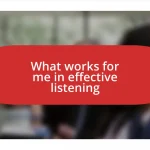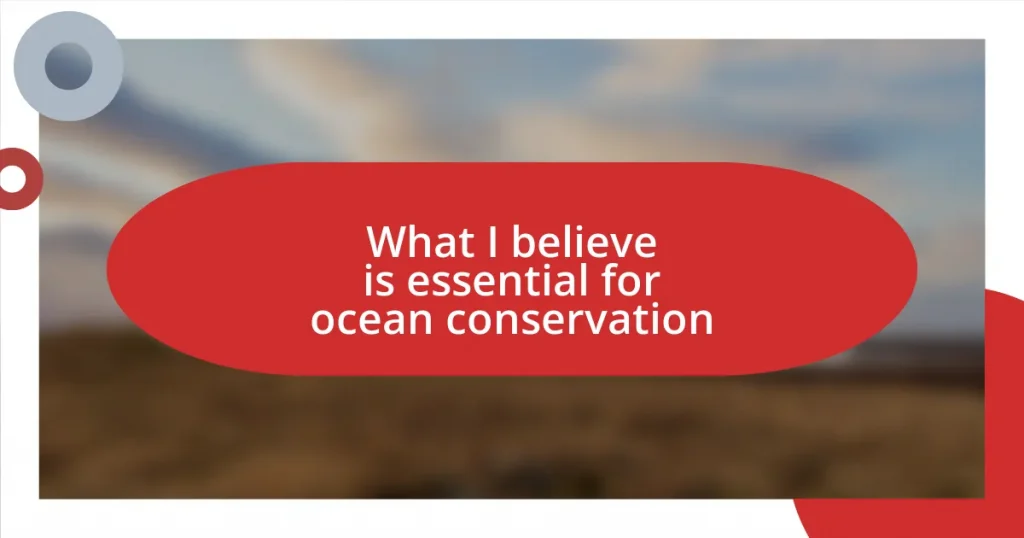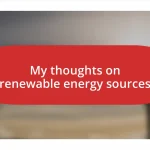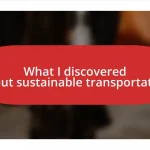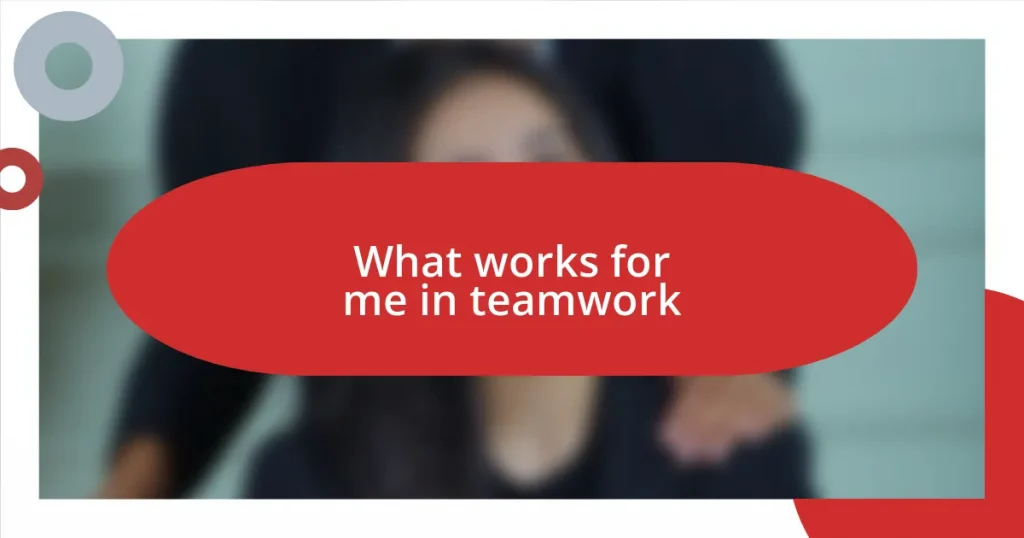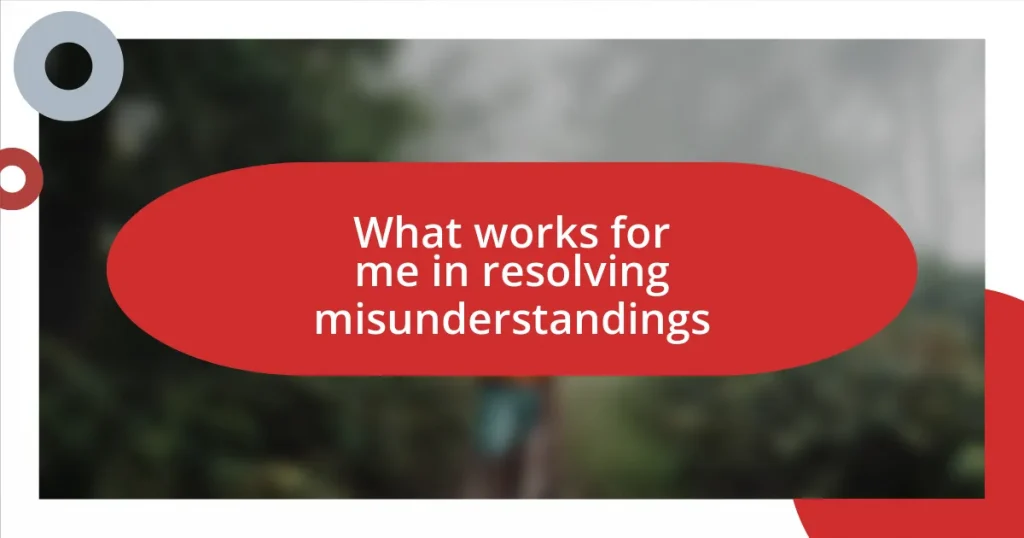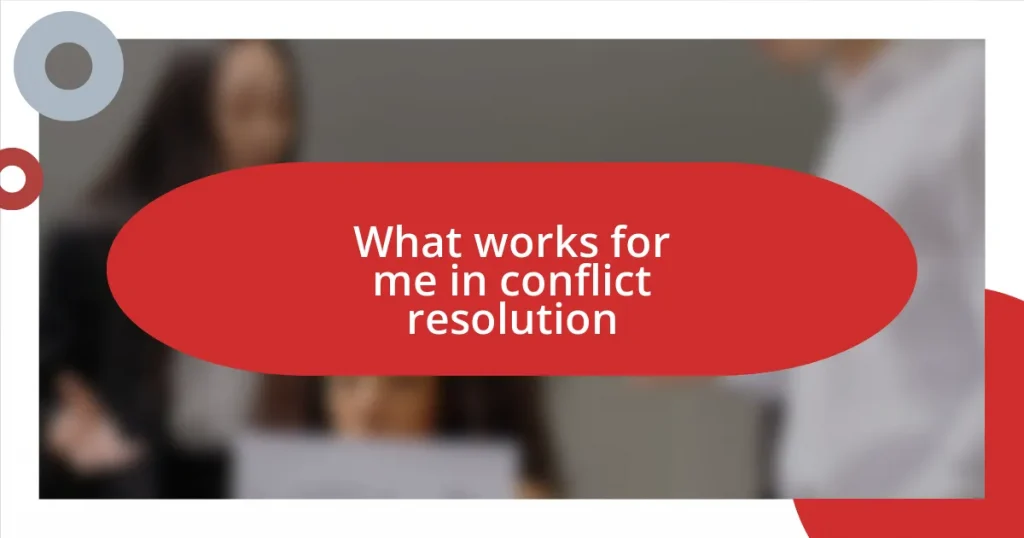Key takeaways:
- The ocean, covering over 70% of the planet, plays a crucial role in oxygen supply and climate regulation, impacting both marine life and human livelihoods.
- Major threats to ocean ecosystems include overfishing, climate change, pollution, and habitat destruction, necessitating urgent conservation efforts.
- Sustainable fishing practices, such as implementing catch limits and using selective fishing gear, are essential for preserving fish populations and marine health.
- Engaging local communities and advocating for policy changes are vital for fostering awareness and enacting meaningful ocean conservation strategies.
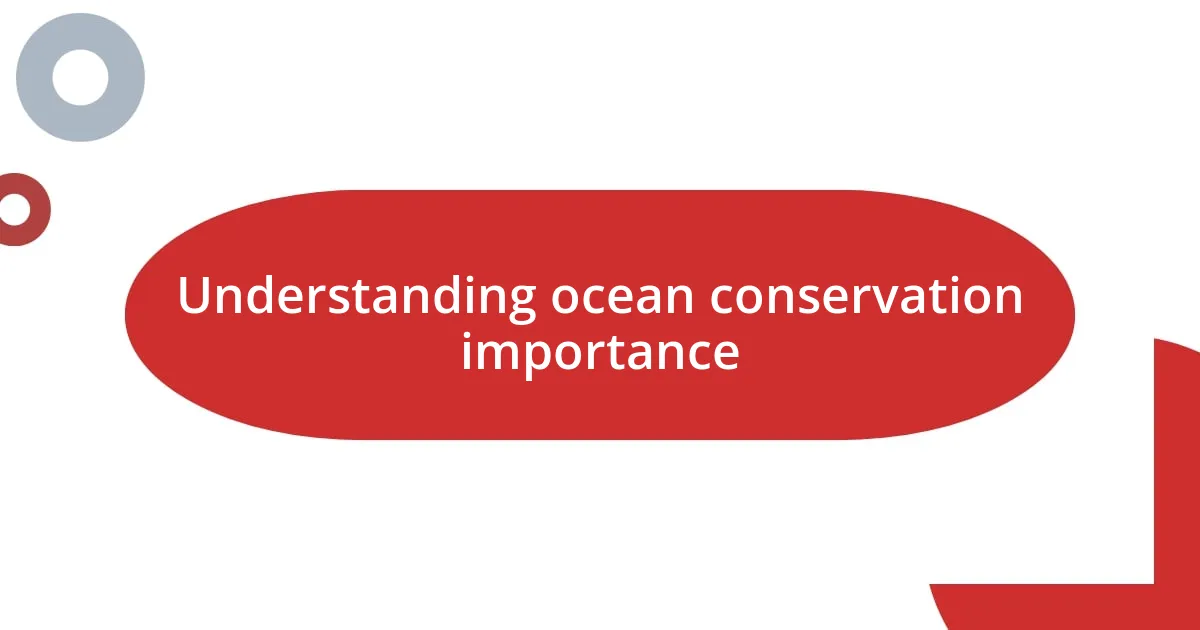
Understanding ocean conservation importance
The ocean covers over 70% of our planet and is home to nearly a million known species. Reflecting on my childhood trips to the beach, I remember the thrill of spotting dolphins playing in the surf. It’s hard to grasp how much these ecosystems contribute to our oxygen supply and climate regulation when so much life exists beneath the waves, isn’t it?
When I think about ocean conservation, I can’t help but feel a sense of urgency. The ocean isn’t just vital for marine life; it directly affects our livelihoods, especially for coastal communities that rely on fishing and tourism. Have you ever wondered what our world would look like if these communities vanished along with the marine life they depend on?
Every time I dive beneath the surface, I am reminded of the intricate web of life that thrives there. The beauty and diversity I’ve witnessed underwater are awe-inspiring, yet the threats to these ecosystems—like pollution and climate change—are daunting. It really makes you stop and think about what we stand to lose if we don’t act to protect our oceans.
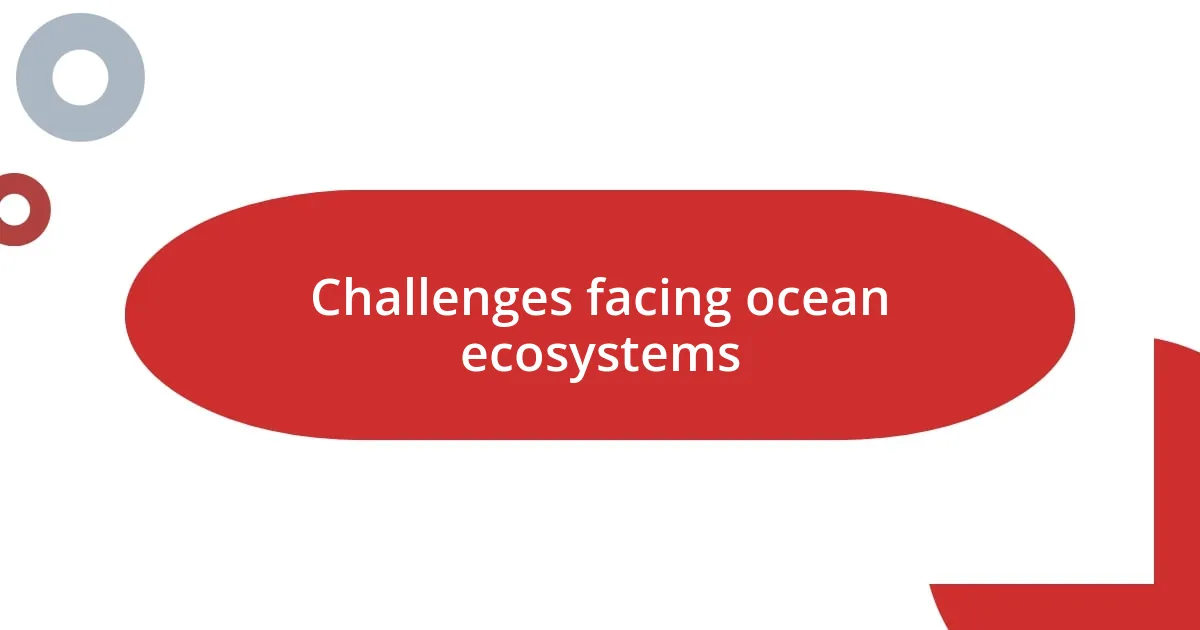
Challenges facing ocean ecosystems
As I reflect on my experiences along the coast, it’s disheartening to see how much our oceans are struggling. The challenges facing ocean ecosystems are numerous and deeply interconnected. From plastic pollution to rising temperatures, every aspect of our human activity contributes to the stress on these vital environments.
- Overfishing: I’ve watched fishermen haul in nets filled with juvenile fish, a stark reminder of how unsustainable practices can deplete fish populations and disrupt marine food webs.
- Climate Change: The coral reefs I admired as a child are bleached and dying. The increasing water temperatures are a direct threat to these ecosystems, which support countless marine species.
- Pollution: I often find myself picking up plastic along the shore, a painful reminder that our waste finds its way into the ocean, harming marine life and impacting human health.
- Habitat Destruction: Each time I visit a coastal area, I notice new developments encroaching on natural habitats, devastating both wildlife and the scenery I cherish.
In navigating the ocean’s depths, I’ve come to appreciate its delicate balance. Yet, the reality is that human actions fracture that balance daily, pushing these ecosystems to the brink. The ocean doesn’t just face challenges; it is in crisis, and recognizing that is essential if we hope to hold onto the beauty and vitality I’ve enjoyed for so long.
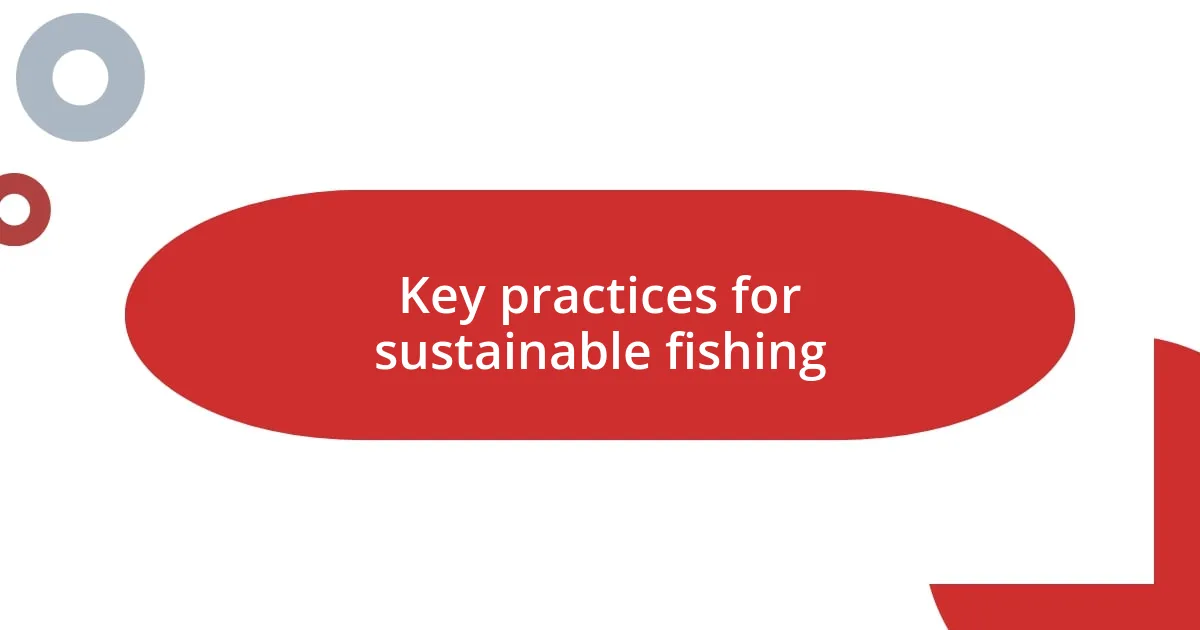
Key practices for sustainable fishing
| Practice | Description |
|---|---|
| Catch Limits | Implementing scientifically determined catch limits helps ensure fish populations remain sustainable over time. I recall a local fishing tournament where catch limits were strictly enforced, resulting in abundant marine life for years to come. |
| Selective Fishing Gear | Using gear that minimizes bycatch protects non-target species. When I went fishing recently, I saw firsthand the difference that specialized nets made toward reducing unintended captures, leading to healthier ecosystems. |
| Marine Protected Areas | Establishing designated areas where fishing is restricted allows fish stocks to recover. Visiting a marine sanctuary, I was amazed by the resurgence of life in areas once depleted—it’s a testament to the power of protection. |
Sustainable fishing practices are vital for preserving our oceans. Restricting catch limits ensures that we don’t exhaust fish populations. I once participated in a community initiative where local fishermen shared knowledge about sustainable practices, and it was enlightening to see how much passion they had for the ocean’s future.
The tools we use can make a big impact. Selective fishing gear not only reduces bycatch but can also enhance our fishing experience. While out on the water, I noticed how the correct net shapes can lead to fewer discarded fish, creating a win-win situation for both fishers and the environment.
Finally, let’s talk about marine protected areas. I’ve had the joy of snorkeling in these zones, witnessing healthy coral reefs buzzing with life. It felt as though I had stumbled into an underwater paradise where conservation efforts were paying off. That experience was a powerful reminder of why we must prioritize such areas—not just for the fish, but for all of us who depend on healthy oceans.
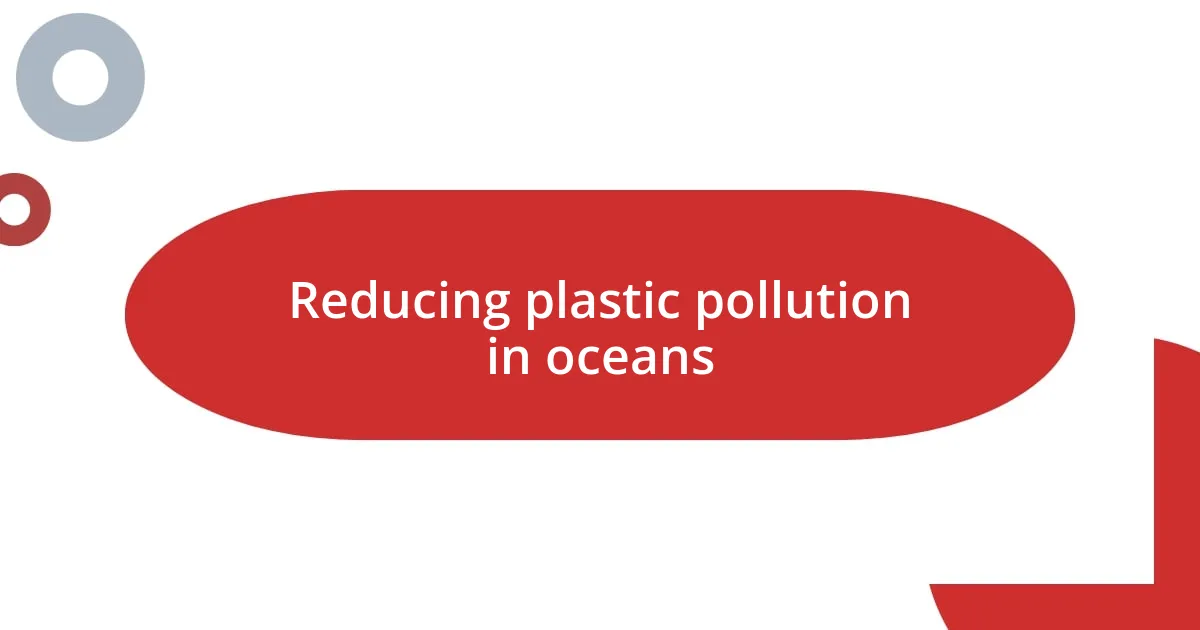
Reducing plastic pollution in oceans
It’s impossible to overlook the staggering impact of plastic pollution on our oceans. I recall a beach cleanup where, within just an hour, my friends and I collected an overwhelming amount of plastic debris—from bottles to straws—each piece telling a story of neglect. Can you imagine how much harm that same waste does to marine life? Sea turtles mistaking plastic bags for jellyfish and seabirds ingesting tiny plastic fragments are common tragedies I’ve read about and seen firsthand.
What strikes me even more is the permanence of plastic in the ocean. Unlike organic waste, plastics can take hundreds of years to decompose, continuously releasing toxic chemicals into the water. The sight of a plastic-filled tide pool once left me feeling devastated, knowing these pollutants threaten not just the wildlife but also people who rely on ocean resources. It makes me wonder, what legacy are we leaving behind for future generations if we don’t address this issue head-on?
Taking action to reduce plastic waste is more crucial than ever. I’ve personally adopted habits like using reusable bags and bottles, each small decision contributing to a larger solution. When I see others making similar choices, it fills me with hope. It’s a collective effort, and I encourage everyone to consider how their behaviors impact our oceans. Wouldn’t you want to help create a cleaner, healthier environment for the creatures that call the ocean home?
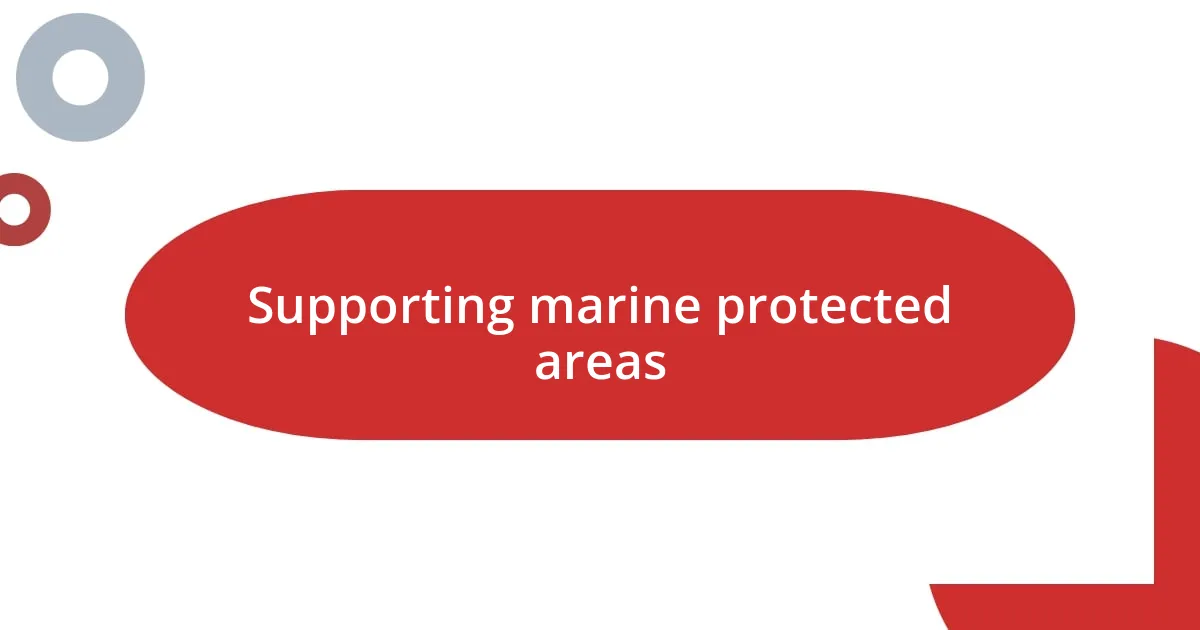
Supporting marine protected areas
Supporting marine protected areas is crucial for revitalizing our oceans. I’ll never forget visiting a marine reserve where fish swam without fear of nets. It was surprising to see how, in just a few years of protection, fish stocks boomed, showcasing nature’s resilience when we give it a chance.
While exploring the vibrant underwater world of a protected area, I noticed the diversity of life thriving. There were schools of colorful fish, and even larger species like sea turtles gracefully gliding by. It made me reflect on how essential these sanctuaries are—not just for biodiversity, but for the balance of the entire ocean ecosystem.
Have you ever thought about the role we all play in supporting these areas? By advocating for marine protections and responsible tourism, we can foster awareness and appreciation for these fragile ecosystems. After all, the more we highlight their importance, the more likely we are to inspire others to join the movement for ocean conservation. Every action counts, and being part of this journey has filled me with purpose and hope for our oceans’ futures.
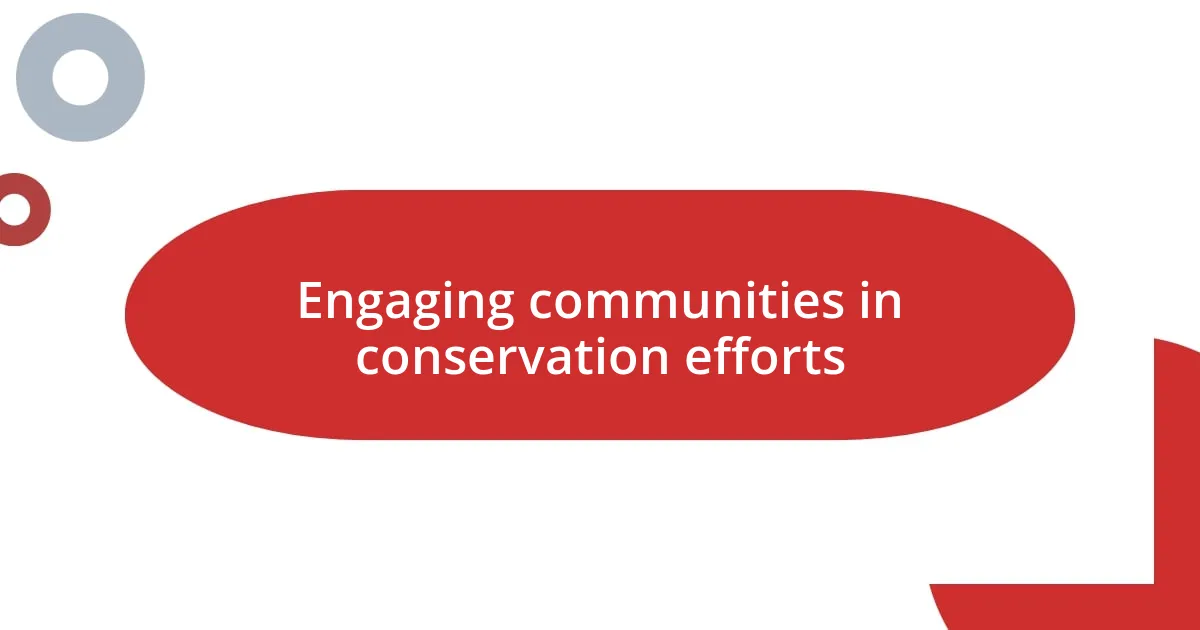
Engaging communities in conservation efforts
Engaging local communities in conservation efforts is vital for lasting change. I remember attending a workshop where local fishermen shared their experiences and concerns about declining fish populations. Their stories were not just data points; they were deeply personal, reflecting years of livelihood tied to the health of the ocean. Can you see how empowering communities to voice their concerns can bridge the gap between science and everyday life?
When local people take part in conservation, the impact can be transformative. I’ve seen firsthand what happens when communities rally around a common cause—like a collaborative project to restore a mangrove ecosystem. The energy was palpable, and it was inspiring to witness individuals from diverse backgrounds working together, learning from one another, and sharing the responsibility for their environment. Isn’t it powerful when people unite for a shared purpose?
Moreover, engaging communities fosters a deeper emotional connection to their surrounding ecosystems. I can still feel the excitement during a beach workshop where children learned about marine life through fun activities. Their eyes lit up as they discovered the beauty and importance of their local waters. This kind of engagement not only educates but also cultivates a sense of stewardship. How can we inspire the next generation if not through hands-on experiences that spark curiosity and passion for the ocean?
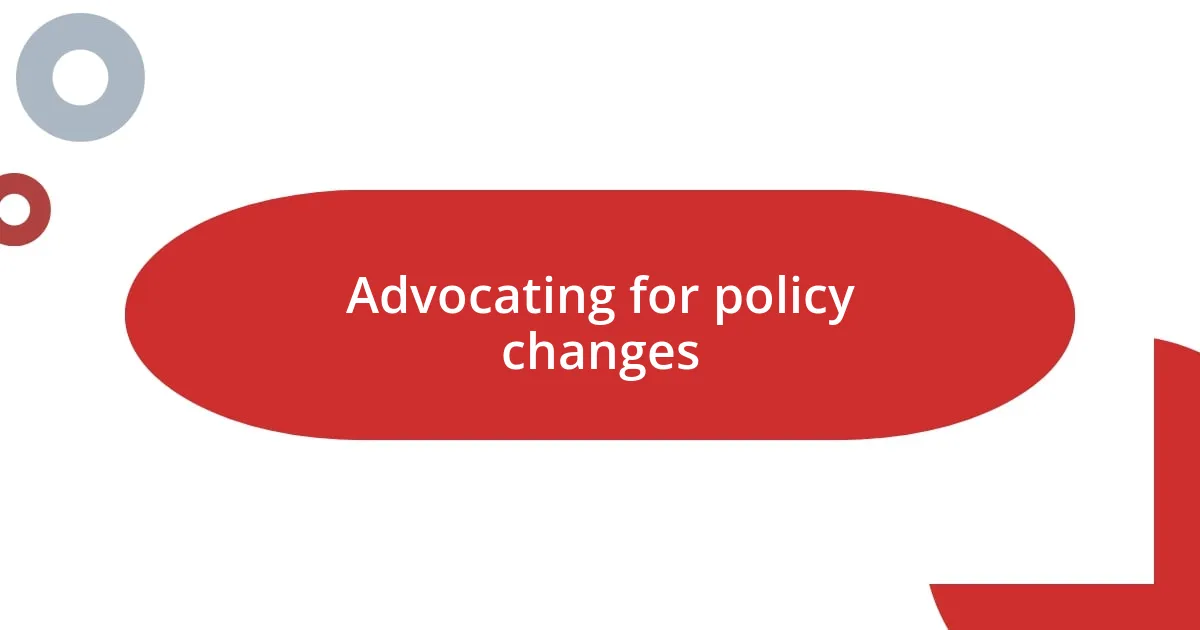
Advocating for policy changes
Advocating for policy changes is a crucial step toward effective ocean conservation. I distinctly recall attending a local hearing where citizens passionately spoke about the need for stricter fishing regulations to protect vulnerable species. Their determination reminded me of the power we hold; when people come together for a common cause, we can push decision-makers to take action for our oceans.
I’ve also learned that educating ourselves about relevant policies can transform our advocacy efforts. One afternoon, I spent hours researching marine legislation and discovered how public comments from ordinary citizens could influence lawmakers. It struck me—have you ever considered how your voice could resonate within the halls of power? Your perspective matters, and when combined with others, it forms a collective push for meaningful changes.
Bringing attention to policies like sustainable fisheries or pollution controls can yield significant change. Recently, I joined an online campaign that urged my local government to adopt cleaner ocean practices. What amazed me was how quickly our community rallied; social media posts turned into a sea of support. The excitement in the air was tangible. It’s inspiring to think that by simply advocating for policy changes, we pave the way for a healthier ocean, don’t you think?



